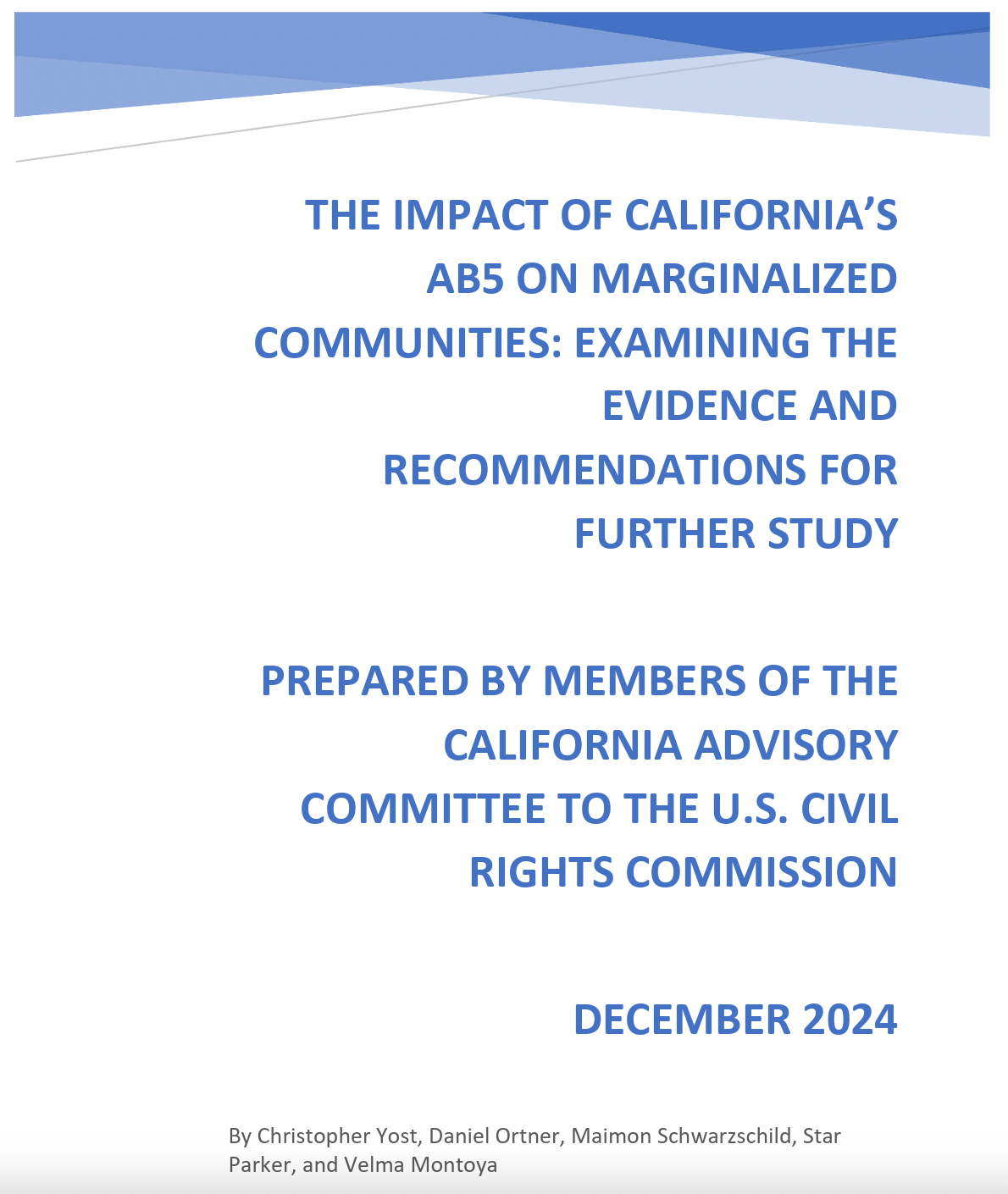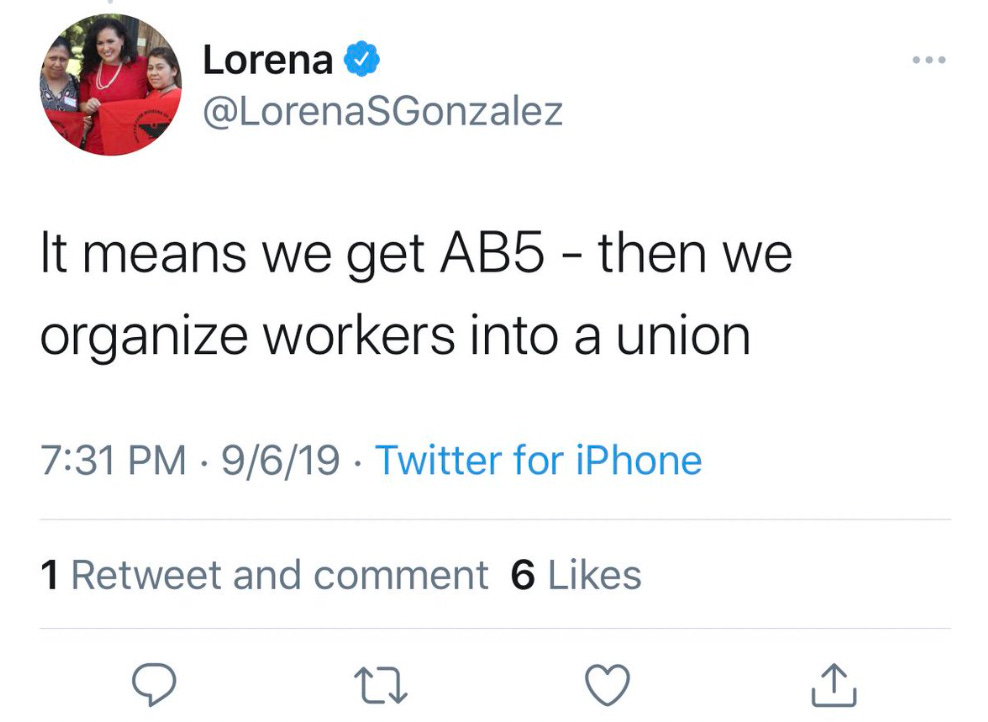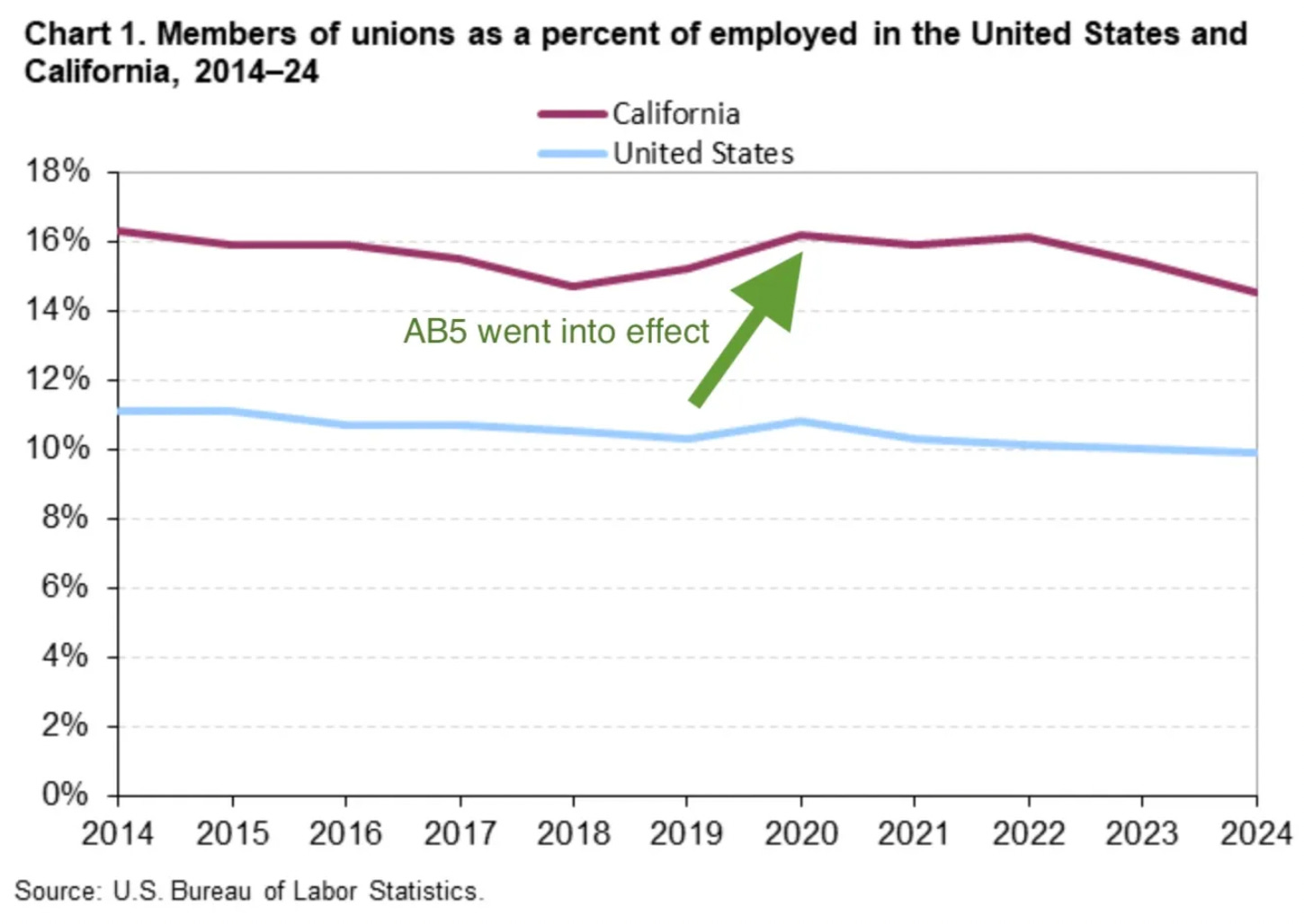The Lost Report
A committee investigated the civil rights effects of California's Assembly Bill 5, but issued no report. These members say America needs to know what happened.
The Civil Rights Act of 1957 created a federal agency called the U.S. Commission on Civil Rights. Its mission is to investigate and analyze situations where people may be deprived of their civil rights, such as discrimination based on race, religion or sex.
On December 3, 2020, almost a year after California’s freelance-busting law, Assembly Bill 5, went into effect, the California Advisory Committee to the U.S. Commission on Civil Rights was created to study AB5’s civil rights implications. The committee’s officially designated term ended December 4, 2024.
There were hours and hours of testimony, much of it recorded on video. But the committee never issued a report based on all this testimony its members heard.
Members of the committee say they were told that if they issued individual statements in the absence of any committee report, they would be failing to comply with the Federal Advisory Committee Act and the rules of the U.S. Commission on Civil Rights.
Late last week, the voices of five committee members became public anyway.
A report they wrote on their own in December 2024 was uploaded to the website of Pacific Legal Foundation, along with multiple transcripts from briefings the committee held. Pacific Legal Foundation has been active in the area of independent-contractor policy, filing lawsuits that challenged AB5 in California as well as the Biden-Harris Labor Department’s independent-contractor rule. I am among the plaintiffs in that Labor Department lawsuit, represented pro bono by Pacific Legal.

In the newly released report, California Advisory Committee members Christopher Yost, Daniel Ortner, Maimon Schwarzschild, Star Parker and Velma Montoya wrote that “the compelling evidence … should not be ignored. We therefore would take this opportunity to inform the Commission and the public about the evidence of disproportionate and unfavourable impact of laws like AB5 and to urge further study.”
The five committee members also noted that the evidence and testimony from California are particularly timely and important for two reasons:
First, because of the federal Protecting the Right to Organize Act, a bill that was just reintroduced in Congress this month with full support of Democratic Party leadership, and that would apply independent-contractor regulatory language based on California’s AB5 all across the country. There is debate happening now in Congress about whether lawmakers should support the PRO Act or, instead, pass the Republican-led Modern Worker Empowerment Act, which is intended to stop what happened in California from spreading elsewhere.
And second, because President Trump recently named Lori Chavez-DeRemer to be U.S. Labor Secretary. This new report falsely states that Chavez-DeRemer “voted for the PRO Act” when she was a member of Congress, however, Chavez-DeRemer did co-sponsor the bill, and her support for it was discussed at length during her confirmation hearing. Chavez-DeRemer was nominated for the U.S. Labor Secretary job with strong backing from Teamsters union President Sean O’Brien, one of the loudest freelance-busting voices in the nation.
The big-picture question these five California Advisory Committee members are referencing in their report is whether lawmakers in other states and in Washington, D.C., should think about what happened with California’s AB5 as a success story or a cautionary tale when it comes to independent-contractor policymaking.
Their report ends with four recommendations. They describe not only AB5 in these recommendations, but also the regulatory language it’s based on (called the ABC Test) and the way California voters supported a ballot measure called Proposition 22 to limit AB5’s effects on app-based rideshare and delivery drivers.
The report’s four recommendations are:
The commission should further study the disproportionate impact of labor laws like AB5 on minorities.
Lawmakers should be extremely cautious before adopting the ABC Test at the national level. The experience of California shows shifting to the ABC Test can result in significant negative consequence. A national, one-size fits all approach is particularly likely to have unintended consequences and harm countless workers across the country.
States should avoid some of the pitfalls that California fell into, including rushing into the adoption of the ABC Test and politicizing the exemption process.
The success of Proposition 22 and popularity of gig work, among other things, in minority communities in California demonstrates the virtue of allowing gig workers to retain their independent contractor status and should caution lawmakers against targeting gig workers.
Inside the Report: AB5 Background
The report opens with a look back at how the State of California came to create Assembly Bill 5 in the first place, and how the ABC Test regulatory language within AB5 was so different from the language the state had been using since 1989 to distinguish between independent contractors and employees.
Since 1989, the report states, California had used a test called Borello to determine independent contractor status. In 2018, the California Supreme Court ruled in a case called Dynamex v. Superior Court. That ruling kicked off the events that led to Assembly Bill 5 being introduced and taking effect in 2020, changing the regulatory language to determine who is a legal independent contractor from Borello to the ABC Test.
The report notes:
“None of the Dynamex parties proposed the adoption of a brand-new test for classification when the case was briefed or in the lower courts. Long after the case had been briefed, and just weeks before oral argument, the California Supreme Court invited the parties to submit letter briefs on whether it should adopt a new test. Less than three months after oral argument, the California Supreme Court, without prompting from the litigants, unilaterally and retroactively, imposed the ABC Test, which wholly ignored eight of the Borello factors.”
The report then states that the “seismic impact of Dynamex cannot be overstated.” Part B of the ABC Test, it states, “was a particularly dramatic change.”
Part B of the ABC Test states that a person can only be an independent contractor if the work being done is outside the usual course of the hiring entity’s business.
This regulatory language, the report states:
“… radically changes the paradigm upon which businesses, including independent contractors, relied and under which California’s courts, Labor Commissioners, and the Employment Development Department made classification determinations for almost three decades. The result of this change was that independent contractors could not contract with businesses that specialize in the same thing that they specialize in.”
What did this Part B of the ABC Test mean to everyday people in real life?
The report continues:
“Under this test, for example, journalists could not contract with a newspaper to write articles, and translators could not take on jobs from a consortium of translators. Bloomberg BNA’s Daily Labor Report, for decades the most trusted source of information for employment-law practitioners, wrote that the decision was regarded as a ‘bombshell’; ‘California … has so dramatically changed its test that many … companies today might be misclassifying workers that were lawfully classified yesterday.’”
The California Legislature then had an opportunity to act. Lawmakers could have mitigated the impact of the Dynamex court ruling. The report notes that the Dynamex ruling only applied to “Wage Order #9, which regulated the transportation industry,” and that the Dynamex ruling itself stated:
“The legislature, of course, retains the authority to revise any provisions of the current wage orders through enactment of new legislation.”
In other words, the Legislature in California had options at that point for creating a law about independent-contractor policy.
According to the report, the next thing that happened was this:
“But legislators and proponents of AB5 falsely claimed Dynamex tied their hands and therefore it must be codified into statute. Within two years of the California Supreme Court’s Dynamex decision, California’s super-majority Democrat-controlled Legislature adopted the ABC Test in AB5.”
There’s video evidence that supports what the report states here, that proponents of AB5 made false claims about the law’s relationship to the Dynamex ruling. In 2020, KUSI News broadcast an interview with AB5’s primary sponsor, Assemblywoman Lorena Gonzalez, who says just after the 3-minute mark that AB5 codified the Dynamex decision into law:
Even some of AB5’s most vocal proponents acknowledged back then that, in fact, the California Legislature went beyond the court’s Dynamex ruling. Professor and AB5 proponent Veena Dubal wrote:
“… California Assemblywoman Lorena Gonzalez introduced AB5 in the 2019 legislative session. The bill extended the legal precedent in Dynamex beyond wage orders to all California employment laws—including those in the Labor Code and the Unemployment Insurance Code.”
The new report’s authors describe the real-world effects of the California Legislature’s decision to adopt the ABC Test by way of AB5.
They also describe several things that happened next as lawmakers and voters responded to the real-world situation AB5 had created, including creating exemptions for some professions so people who had long been considered independent contractors could continue to earn a living:
“… Dynamex and AB5 eliminated livelihoods, industries, and the agency of California citizens to engage in entrepreneurial activities as Independent Contractor, imposing either an employee-employee relationship, eliminating their business model, or forcing them out of state.
“Californians immediately began to suffer under Dynamex and AB5, losing their livelihoods and being unable to find work. The toll was particularly severe on creative professionals who were devasted [sic] by the B prong of the ABC Test.
“Supporters of AB5 scrambled to fix the damage AB5 had caused. On September 4, 2020, eight months after the enactment of AB5, California Governor Gavin Newsom signed an updated version of the new law, called AB2257. Under the amended law, exemptions from the ABC Test were even expanded further. For example, recording artists, landscape architects, translators, copy editors and illustrators, real estate appraisers, home inspectors, and several other categories of freelancers …
“The evidence of the influence of the powerful union lobby on the seismic change in the classification paradigm is clear in the exemption process. The California legislature essentially outsourced the decision-making process for obtaining an exemption from AB5. The result was the politically powerful and those in industries not historical targets of organized labor were more readily able to obtain an exemption.
“However, one industry that was heavily targeted by labor unions, the so-called ‘gig economy’ including apps such as Uber and GrubHub, successfully went to the voters to enact Proposition 22 to retain their drivers’ status as independent contracts [sic]. Proposition 22, preserving the Independent Contractor status of these drivers, passed by the large margin of 58% to 42%. The demographic data indicates minority communities were more likely than majority communities to vote for Proposition 22.”
Proposition 22 was on the ballot in California in November 2020. A month later, in December 2020, the California Advisory Committee to the U.S. Commission on Civil Rights was formed to hear witness testimony about AB5’s effects.
Inside the Report: Committee Testimony
According to the report, the committee heard testimony from people in numerous professions as wide-ranging as court reporters, translators, cosmetology workers and exotic dancers.
The report states:
“Many of the workers we heard from are women, immigrants, people of color and from other politically disadvantaged groups. While some workers had positive experiences with AB5, the bulk of the testimony we heard suggested AB5 had a decidedly negative impact, causing individuals to lose work and no longer have the option to be independent contractors.”
Testimony was particularly compelling, the report states, from translators and interpreters, truckers, people in the performing arts, and exotic dancers.
The report includes numerous examples, including this one about the trucking industry:
“This industry is comprised of minorities, including Hispanics and African Americans, who built business around transporting freight in some of our biggest ports and earned, in some cases, $5,000/week. AB5 has caused widespread displacement, increased costs, and loss of opportunities. For instance, in June 2023, the City of Los Angeles terminated a 132-year-old program called the As-Needed Haul Truck Program, costing hundreds of independent truckers and their families their livelihoods. The program is comprised of 87% minority drivers, many whose fathers and grandfathers worked in the program.”
Another example the report gives involves exotic dancers:
“AB5 has had the pernicious effect of reducing work opportunities for minority, transgendered and undocumented exotic dancers … the shift to employment status has driven many of them into dangerous sex work and deprived them of Medicare and MediCal.”
Yet another example the report details is about forensic nurses:
“… we heard testimony from a forensic nurse who stated AB5 has had detrimental impact on the ability of rape victim [sic] to seek justice. Many forensic nurses work as independent contractors for hospitals, providing sexual assault forensic medical evidentiary examinations. Without the availability of forensic nurses, particularly in rural hospitals, patients who have been sexually assaulted can suffer long wait times and may receive substandard exams if provides [sic] by untrained medical personnel in an emergency department. Rural hospitals in particular cannot keep a forensic nurse on staff full time. They are called in as needed.”
There are additional examples in the report, and the authors’ summary makes clear why they thought it was important for this testimony to be brought to the public’s attention, and to the attention of lawmakers who are considering bills like the federal PRO Act that is based on AB5:
“… we heard compelling testimony suggesting that AB5 has subjected marginalized workers to increased discrimination … much of the information that we received was anecdotal rather than empirical. However, the testimony we heard came from a significant number of different industries and circumstances, suggesting the unfavorable impact of AB5 is quite widespread.”
Related Research
During the years that this committee was meeting to hear testimony, additional research was done elsewhere about AB5 and its effects. That outside research supports what this report’s authors are stating.
The Mercatus Center at George Mason University issued a working paper in January 2024 that looked at what happened in California after AB5 went into effect in 2020. The results, according to Mercatus, were that “AB5 did not simply alter the composition of the workforce as intended by policymakers. Instead, AB5 resulted in a significant decline in self-employment and overall employment in California.”
That study’s authors wrote that in California:
Self-employment decreased post-AB5 by 10.5 percent on average for affected occupations.
Overall employment decreased post-AB5 by 4.4 percent on average for affected occupations.
AB5 did not necessarily lead to the hoped-for growth in traditional employment.
Federal data also has since been released about whether California saw an increase in unionization following AB5’s implementation. This is significant because the intent of AB5 was to grow unions. Historically, independent contractors have been protected from union organizers and have been able to earn income as their own bosses. AB5 was an attempt to reclassify independent contractors as employees, who can then legally be unionized.
Assemblywoman Gonzalez stated this intent of AB5 quite clearly on social media:
Governor Gavin Newsom, when he signed AB5 into law, also stated that AB5 was intended to help increase union membership:
“Assembly Bill 5 is an important step. A next step is creating pathways for more workers to form a union …”
That’s not what happened, according to the U.S. Bureau of Labor Statistics. In fact, unionization rates have dropped in California since AB5 went into effect in 2020:
This additional research from outside sources lends credibility to the report by the five members of the California Advisory Committee to the U.S. Commission on Civil Rights.
As Pacific Legal’s team noted when the foundation uploaded the report for the public to review last week:
“Congress has several times considered the PRO Act, nationwide legislation that would essentially federalize AB5. It should consider that the likely demographic effects of such legislation may be very different from what such legislation’s supporters claim.”
All of which is what countless independent contractors have been telling state and federal lawmakers for years now, including by forming grassroots advocacy groups such as Freelancers Against AB5 and Fight For Freelancers (where I’m a co-founder).
We, like the authors of this new report, continue to ask lawmakers to listen.






